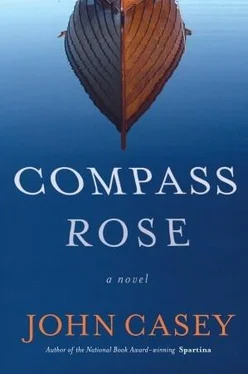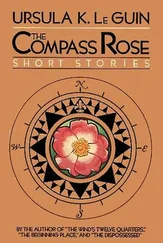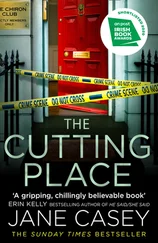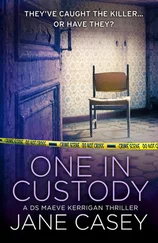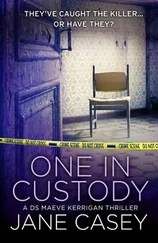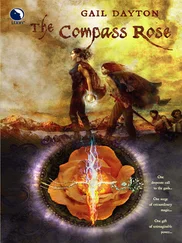She wouldn’t give up a minute of it. She wanted to teach Rose to sing, to tie her shoes, to read, to tell jokes, to stand on a footstool by the stove, taste the soup, and say, “It needs a pinch more salt.” She would give in to time seeping through her if Rose would walk along the beach with her or shuck corn with her on the kitchen porch, and someone walking by — May or Dick or Elsie’s sister, Sally — would hear Rose make a snappy comeback or sing a bit of song and say, or just be keen enough to think, “There’s a good deal of Mary in Rose.”
Mary stopped pedaling. What if Elsie got married?
And what brought that to mind? A test thrown up to measure her — a little race between good and bad. She was pretty sure she’d thought first of what would be good for Rose and Elsie, second of how she herself would be shunted into an outer orbit. Pluto, Neptune, Uranus — whichever was coldest and farthest. Once she started examining her conscience she wondered if her eagerness to bring Rose over to visit May and Dick was a way to keep herself near the center of Rose’s life.
And what if it was? It was still the right thing to do. May deserved whatever comfort she chose; Dick deserved some difficulty. And that brought her back to herself, to how she was busting into every life but her own.
Elsie came in laughing. She stomped snow off her boots, dropped her bag and tennis racket, slid out of her goose-down jacket and let it fall. She said, “I haven’t done that in years.” She glided across the room and sprawled on the sofa.
Mary got off the Exercycle and hung up the goose-down jacket. She swept up the snow by the coatrack and threw it out the front door. She said, “Where’s your car?”
“I left it at the bottom of the hill. I’ll call Eddie tomorrow.” One arm lay across her eyes; the other trailed across her stomach. One foot was on the floor. Her knee swung out a little, then back against the sofa cushion. She said again, “I’ll call Eddie,” her voice floating out lazily.
Of course. Eddie to plow the driveway, Sylvia to spend the night at Miss Perry’s, Mary to mind Rose, Elsie to purr on the sofa.
Mary squeezed her lips together. She would rather her hair turn completely gray than let herself turn cold and spiteful. She could live with her warm-blooded sins — anger, lust, gluttony — but not this hiss of envy.
Mary thought of her old days on her own, the Sunday-morning brunches she’d prepared after closing on Saturday night. How had she had the energy? Red-crab bisque, brioches stuffed with veal kidneys, smoked trout, oatcakes with lemon curd. Soups and stews were all the better for being in the pot a day or two, and the cold dishes had only to be laid out — it was the oatcakes and brioches that made for an early Sunday-morning flurry. But she’d loved it. She’d felt whole, more than whole — abundant.
Once in a while this boyfriend or that stayed after closing on Saturday; once in a great while one of them actually helped. She’d give them a spoonful to taste, stir the lemon curd in the double boiler, roll out dough on the marble counter. They all thought she was sexy in her kitchen.
When the lids were back on the pots, the raw oatcakes stashed in the fridge, the trout sprinkled with dill and covered with wax paper, she’d collapse into a chair, drink a cold beer, let her hair down. She’d sometimes put the long cushions from the window seat in front of the fireplace and spend the night, wake up with the winter sun, take a bath standing in a metal gardening tub, sponging off the smell of dill or cinnamon or sex. She liked sex, just hadn’t had a lot of luck finding companionship, a sense of humor, and satisfying sex all in one person. Two out of three wasn’t enough to set up house. She’d only had passing glimpses of men who set off full fantasies of lovemaking, conversation, and breakfast. She sometimes thought she could have been happy with the short, bald musician — one of a trio she’d taken pity on when they’d showed up just as she was closing on a snowy night. The last she’d heard from them was a postcard from all three — they were playing in Vancouver.
And here she was with Elsie. Elsie, who thought a big meal was sabotage, who thought singing was so much noise, and who now lay swooning on the sofa.
Mary made an effort. When she was ten she’d got an English bicycle for Christmas, a bigger present than the baseball mitt and football her brothers got. They stared at her bicycle, slouching and sour-faced. Her father said, “Never mind all that. We’re off to Mass, and I want to see the two of you on your knees praying for the decency to rejoice in your sister’s good fortune.”
The phrase became a family joke. She couldn’t remember how long it took to fade, maybe as long as it took her to outgrow the bicycle. She did remember that being the object of envy was painful. This sensation lingered in a fragment of memory that detached itself from time but drifted back across her clear remembering, the way a floater drifted across her eye.
She got back on the Exercycle. She gripped the handlebars and began to pedal slowly. “… On your knees praying for the decency to rejoice in your sister’s good fortune.” Elsie lolling on the sofa, her lips a little puffy — not exactly the good fortune the old man had in mind that Christmas morning. But if you gave him enough time he’d get the joke, even if it was on him. At least he’d got that one. But what about this one? What’s my favorite daughter got up to now? (That was an even older joke: “Ah, here she is — my favorite daughter.” “But Dad, you’ve only got one.” “Is that right? Just the one?”) And here she is pedaling a bicycle that’s going nowhere, minding a baby that’s none of her own, wishing away a pang of envy, and hearing his voice, hearing now the shy love in it.
She began to cry. Just tears and a sniffle at first, then a sob she couldn’t help. Elsie took her arm from over her eyes. “Mary?” Elsie sat up and came over, tried to hug her but bumped into the end of the handlebar, came to the side and had to fend off Mary’s knee with both hands as it cycled up.
“Jesus,” Mary said, and took a breath. She was still crying as she started to laugh. “This thing is a menace.”
“Mary,” Elsie said. Mary could see Elsie was also caught in between — wasn’t sure if she should laugh yet.
“It’s okay,” Mary said. “I was just remembering some stuff. Look out now — I’m getting off this thing before it kills us both.”
Elsie took a step back, reached forward to take Mary’s hand. Elsie said, “I’m sorry I was late. I’m sorry for … whatever it is.”
“I’ll tell you in a bit. What with pedaling and crying, I’m ready for a beer. So. You and Johnny hit it off?”
There. Halfway there.
Mary went to the fridge and held up two bottles of beer. Elsie nodded. They sat on the sofa. Elsie said, “In my station wagon,” and laughed the way she had when she’d come in.
Mary heard Elsie laugh, heard herself laugh, felt the beer go down her throat, heard Elsie go on talking, but she herself wasn’t all the way back from where she’d been. She’d always been proud of her memory; she remembered songs, stories, conversations; she was the one her brothers called late at night to remember things for them. When her memory jogged along the regular paths, it was a pleasant little outing. Now she was wary. Time might be less ordering than she’d thought. The tenses — I am, I was, I will be; I love, I loved, I will love — lost their certainty when she was engulfed in memory that pulled her … Where? Why was the North Pole up, the South Pole down? She could get dizzy thinking about the earth in space, and once the earth turned or fell over onto its beam ends, all the other pretty pictures, the solar systems, the — What next? The galaxy? — she got the spins.
Читать дальше
